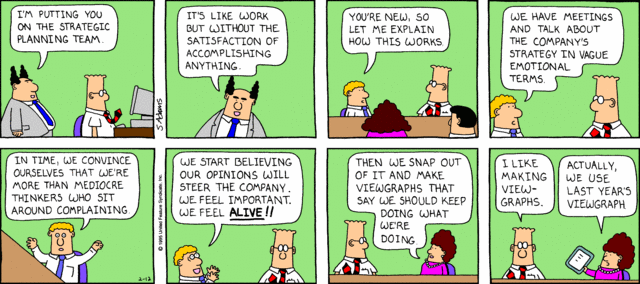A Culture of Fear
Some of this fear stems from a completely dysfunctional U.S. government bent on opposing anything the other party desires or focusing so tightly on extremely uneducated philosophies that at no level can they be trusted to do what's in the best interest of citizens. The perception that our government only works for large corporations and those who've earned enough wealth to purchase legislators for self benefit is so commonplace that it's normal and acceptable. Not quite what the founders intended.
 A combination of the short-term outlook of quarterly profits and the global economic crisis (directly related to each other) drives a fear of financial and job insecurity. An overhanging fear that not meeting the daily goals leading to the weekly goals so the monthly target is reached inhibits not only quality customer service but the health of many workers. While the vast majority of Americans would leave their job for another one if they could, most of us struggle with increased responsibilities after years of downsizing in direct conflict to higher performance metrics passed down from above.
A combination of the short-term outlook of quarterly profits and the global economic crisis (directly related to each other) drives a fear of financial and job insecurity. An overhanging fear that not meeting the daily goals leading to the weekly goals so the monthly target is reached inhibits not only quality customer service but the health of many workers. While the vast majority of Americans would leave their job for another one if they could, most of us struggle with increased responsibilities after years of downsizing in direct conflict to higher performance metrics passed down from above. Yet growing awareness of the vast income inequality for those in management (it's not leadership) decreases trust, increases stress and hinders the ability to focus. Far too often the fear of making a mistake on the job makes it easier to say "no" rather than meet the customer's need or solve the problem efficiently and profitably. Fear that our ideas will not be given credit or rewarded in any way or ridiculed by others keeps us quiet when we know in our hearts it is the right thing to do. We want to leave, but the comfort zone of our cubicle and team member relationships keeps too many from reaching potential. After all within our regions there are limited organizations to choose from and too many of them operate in a management system nearly 50 years out of date.

If one has committed relationships and offspring the fear that for the first time in American history one's children will be worse off we are is ever present. One can create (and should) our own list of fears which have lead us to inactivity and increased stress. In his Dune series of science fiction novels, Frank Herbert noted that "fear is the mind killer". We can't overcome fear or reach opportunity potential if we don't know what's holding us back; individually, as a team, or corporately. And we certainly can't overcome them all at once.
One of my life quotes (everybody should have a few) to stand on that doesn't come from scriptures is a variation on Edward Everett Hale:
I am only one, but I am one. I cannot do everything but I can do something. And I will not let what I cannot do interfere with what I can do.Others might prefer the Serenity Prayer. Whether individually, our immediate family, in our organizations or corporately the most effective way to overcome fears is to DO SOMETHING. To stand for something greater than ourselves and make a positive difference in the life of someone else. Organizationally if we strive to meet customer's needs (reasonably, affordably and immediately) and consider that every individual we work with is also a customer we often find that our own needs become met along the way. And the fears that hold us back from achieving our potential become distant memories as we move forward. Learning, growing, adapting and along the way that builds a support network catching us when we fall as we all occasionally do.
Paddy Chayefski famously wrote in the script for Network, performed by William Holden: "I'm mad as hell, and I'm not going to take it any more." I don't believe attitudes and behavior out of anger are productive most of the time, but mentally that may be what we need to do internally to step forward in action. Each day is a new opportunity to face whatever is holding us back and choose to mentally reframe yesterday's fear into today's possibility. Then of course we must do something. We weren't given these brains and bodies to sit idly by but to engage in activities and behaviors that create a better future than what we may see in the present.





Comments
Post a Comment
Thank you for sharing your worldview.